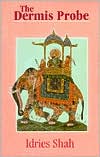

 |

|

The average rating for Dermis Probe based on 2 reviews is 4.5 stars.
Review # 1 was written on 2016-04-12 00:00:00 Jeff Ullrich Jeff UllrichThe Dermis Probe is named after Idries Shah's award-winning film based on Sanai's and Rumi's ancient tale: The Blind Men and the Elephant. I've read this book many times. Often I've had a strange feeling that this exotic mind-bending hodgepodge of tales and aphorisms formed a comprehensive expression of Sufi thought and action. It's all there. It is an "Elephant" of a book. Like a blind man I've used "touch" to try to understand it: making assumptions, associating it to what I think I know. From time to time, I realize I can't "see", something the sightless men in the tale never do. Yet this book also has useable bits that have helped me find balance, perspective & effectiveness from time to time. Here are a few examples: The barren branches may appear inelegant: They are, to the cook, the means to make his fire. Patience is a garment which has never worn out. If you have no troubles - buy a goat. Call yourself unlucky only if you take up coffin-making and people stop dying. The Dermis Probe is unique, unexpected and bracing. It seems to come from another world and yet speaks to us here. The bulk of it is hidden but it beckons us to search for the eyes to see. |
Review # 2 was written on 2014-07-18 00:00:00 JAMES HEATH JAMES HEATHA collection of tales, narratives, aphoristic-like expressions, and a space-fiction film script by Afghan traveller and authority on the Sufis, Idries Shah. The title piece, an animated film, derives from Sanai's and Rumi's stories of the blind men (or men in the dark) trying to understand an elephant by touching parts of it -- and among its messages is that, in approaching Sufism, it is not possible to get an idea of the whole of it from such disparate parts as may have come to an inquirer's attention. (Shah's endnotes show that conventional scholastic workers appear to have little clear idea about what Sufism is.) There are many lessons in this book. One famous story, "Pomegranates" (which Shah also retells elsewhere in his writings), shows in one of its senses how an unexpected element may be the decisive one in situations -- and how our assumptions can blind us to it. The book can help us to increase our perceptions and reduce some of our foolishness. And it's very entertaining as well. |
CAN'T FIND WHAT YOU'RE LOOKING FOR? CLICK HERE!!!